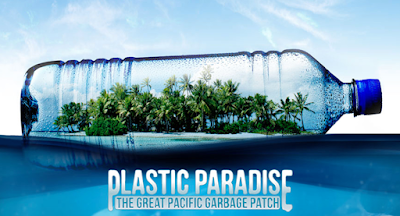Plastic Paradise
(Directed and Written By Angela Sun)
(Post by Priscilla Velez)
Here’s a scary fact: according to the Earth Policy Institute “over 1 trillion plastic bags are used every year worldwide”. Find more facts at: http://www.reuseit.com/facts-and-myths/learn-more-facts-about-the-plastic-bag-pandemic.htm
What’s even scarier? The fact that plastic NEVER DEGRADES. Which means that every single plastic ever created on this Earth still remains somewhere. In fact, most of the plastic has ended up in the ocean, threatening the ocean ecosystem and causing the death of an innumerable amount of organisms by means of plastic consumption.
We as consumers have become so accustomed to the convenience of plastic that we have been blindsided by its detrimental effects on the environment. In Plastic Paradise, Angela Sun explores the origins of plastic, its role in the economy, its effects on the ocean environment, and its future. Before I begin delving into the details of the documentary, I want to say that I HIGHLY recommend the film. It definitely leaves an impact on you and leaves you with a sense of obligation.
Sun begins by describing the history of plastic, explaining that plastic was specifically created to be indestructible. This desired characteristic of plastic, although understandingly fitting, has only proved drastic when plastic has been only created for one-use products. The end result has been a massive production of indestructible plastic, leaving its trace prominent within oceans and landfills. Despite not being mentioned by Sun, I wondered how are we supposed to remove all of this plastic? Using combustion processes or any other industrial process would only hurt the Earth even more by causing air pollution. The importance of thinking eco-friendly is clearly demonstrated here.
Throughout the rest of the film, Sun describes to what extent plastic pollution has affected the oceans, and uses eye-opening pictures and videos of litter accumulation and litter-filled animal insides to emphasize her point. It’s a clear way in which we can directly see how our actions have affected the environment.
Perhaps one of my favorite aspects of the film is the economic twist to it. Believe it or not, all, if not most, environmental concerns have resulted from the desire for money. The obsession of the human race for an insignificant piece of paper has been largely responsible for destroying the Earth. Corporations are our enemies, because they only want money, not taking into consideration the cost of what they do to ensure their acquirement of money. Corporations feel no remorse nor guilt in destroying Earth. (How ironic, considering that there are much more stimulative and beautiful aspects that surround us besides paper that can buy us temporary satisfaction.)
Sun mentions that the plastic industry is the THIRD largest industry behind steel and automobiles. Because of the plastic industry’s ability to produce large amounts of money, corporations involved in the industry show no concern in ensuring that what they are producing is both safe and eco-friendly. In fact, corporations involved in the plastic industry have been lying to customers, for years, about the safety of plastic. Most plastics are known to contain BPA, or Bisphenol A, a disruptor of the human endocrine (hormone) system. BPA is found within 93% of human bodies, and can travel to organs, including the brain. How have corporations responded? Corporations have responded by not responding at all, or untruthfully claiming that BPA is not harmful, despite the plentiful evidence that proves so. In addition, corporations have went out of their way to sue organizations and even city governments who have attempted to take environmental action.
There are scenes in the film where Sun goes to a conference in which plastic companies are participants of. Sun speaks to many business officials, leading to one of the most ignorant responses I have heard (among many others in these scenes). Sun shows a businessman a picture of a dead bird’s stomach full of plastic. His response: “Well that’s not good. That’s a pretty dumb bird. Shouldn’t be eating plastic.” Ironically enough, the company he works for has led to such an occurrence.
Lastly, the most interesting and insightful part of the film is the fact that although recycling can play a significant role in removing litter in the ocean, it’s not enough. We can recycle all we want and clean all we want, but those actions won't mean anything if we aren't directing action against its source. We need to find, if not create, a way in which we can limit the production of plastic and instead promote the use of reusable products and materials. Linked below is an amazing link to exactly how you can do that:
Call to action: we need to choose government officials who will implement environmental action through laws and will put policies in place. We need to be smart consumers and choose businesses wisely.

No comments:
Post a Comment